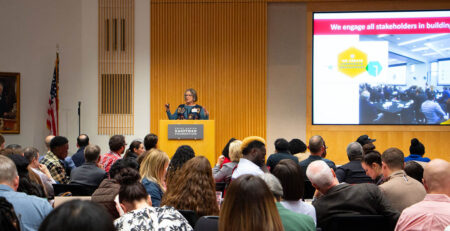This New Certification Can Help Education Tech Startups Make the Grade
If you work with educational products in the tech space, this new opportunity out of Kansas City can help you solidify your startup.
Leanlab Education, a KC-based nonprofit that builds community around education innovations, announced its new certification for educational technology products.
Why is this certification important?
The new Codesign Product Certification verifies that qualifying, education-technology companies iterate their products based on authentic, school-community recommendations and feedback from Leanlab’s codesign research process. Codesign is a collaborative process that Leanlab uses to unite critical insights from school communities with the expertise of researchers and product developers.
Who’s eligible?
Educational technology companies who have completed a research study with Leanlab and made product modifications based on the recommendations of teachers and students during that study are eligible for the certification.
“We want to give teachers and school administrators a quick way to understand if an edtech product reflects the insights of educators, students and, parents — the true end users in education — and was built for the realities of classroom environments,” says Katie Boody Adorno, Leanlab founder and CEO.
What’s the goal of this certification?
The new certification aims to bring greater transparency to the edtech marketplace and signals to educators that the products they buy have been developed with school communities, rather than for them.
What startups are paving the way?
The first certifications will be awarded to Boddle Learning, Classcraft, Levered Learning and Sown to Grow. These four companies completed research studies with Leanlab and its school partners during spring 2021, and since the conclusion of the study have made product modifications based on feedback from teachers and students.
Boddle Learning (Tulsa, Oklahoma)
Boddle is a game-based learning platform that helps K-12 teachers assess and differentiate their students’ learning to improve academic outcomes in STEM.
-
Edna Martinson, co-founder
-
Clarence Tan, co-founder
Classcraft (Montreal, Quebec)
Classcraft is a student behavior and motivation solution that allows students and teachers to identify, reward and monitor behaviors of interest.
-
Shawn Young, CEO and Co-Founder
Levered Learning (Santa Cruz, California)
LeverED Learning is a competency-based math curriculum founded by former teacher Mitch Slater after using a competency-based method for 20 years in his own classroom.
-
Mitch Slater, CEO
Sown to Grow (Oakland, California)
Sown to Grow is an SEL solution that allows students to set goals and monitor their academic and behavioral progress.
-
Rupa Chandra Gupta, Co-founder and CEO
“Our approach to product-design has always been fueled by feedback from real-world users, but working with Leanlab allowed us to speed up the cycle,” says Mitch Slater, CEO of Levered Learning. “During the pandemic, being responsive and adaptive was more critical than ever, and Leanlab helped us see what was working and where we could improve in time to make the changes that mattered most to teachers and students.”
When are companies eligible for the program?
Companies are eligible for certification six months after the culmination of their research study and after they have demonstrated product modification based on the research recommendations and school community insight.
Who’s in the next cohort?
The next cohort of companies eligible for certification include Pango, BeeReaders, Schoolytics, Crib Coaching, Career Village and CodeAlgo Academy.
“We’ll be expanding the eligibility for any edtech company in the next year and creating a more expansive measure of an edtech company’s continuing commitment to the values of codesign,” said Dr. Erin Huebert, principal researcher at Leanlab Education.
What types of studies are offered?
Leanlab offers five types of studies based on the stage of the company:
-
Sandbox studies are for early prototypes aimed at understanding if a product is needed.
-
Usability studies improve the product’s ease of use and basic functionality.
-
Feasibility studies improve the product’s ability to be used within the day-to-day classroom environment
-
Implementation studies help companies understand the conditions in which a product is used best and sustain engagement throughout an academic semester.
-
Correlational studies measure if there is a relationship between the product’s use and intended incomes.
For more information, check out Leanlab Education.





Leave a Reply